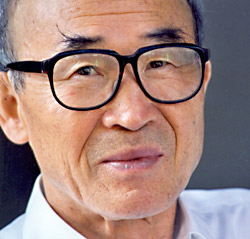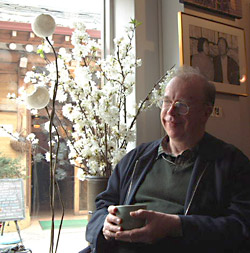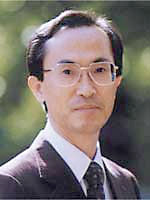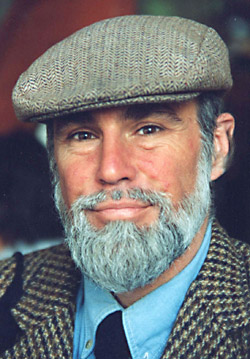
This piece is about 4 printed pages long.
It is copyright © Ko Un, Brother Anthony of Taizé, Young-moo Kim, Gary Gach and Jacket magazine 2007.
These are forthcoming in Green Integer’s Songs for Tomorrow : A Collection of Poems 1961–2001 (Nov-Dec 2007).
Untitled
Here’s an old-fashioned poem of the kind written before 1950,
usually entitled “Untitled.”
One day I took a pebble from
an East Sea beach and put it in my pocket
but it jumped back out, shrieking.
As it hurtled off into the distance,
it failed to make the slightest sound.
It had no idea of the strong emotions I was longing for.
Out at sea are flocks of seagulls
ready to peck out and swallow facile words.
New Year’s Day
This is the loneliest spot in the country on New Year’s Day.
I’ve spent the whole long winter here,
devoid of everything.
It’s been a week already since the boats stopped running.
Chuja Island goes on getting smaller
until sad eyes cannot see it.
Don’t overturn the glass from which you drank.
Once you’re past thirty,
you can make friends with an empty glass.
Tell me, wind: what can I hope for on New Year’s Day on this remote island?
After some tedious, very tedious reading
by the light of a small oil lamp,
I mutter a single drunken line
but vowels alone can’t make it audible
as far as that widower’s tomb out there.
So, wind: let none live here but those who will die here.
Endurance is the greatest journey of all.
Even if the boats are completely overwhelmed by the gale,
I’m going to set out, though I’ve got no overcoat.
Tell me again, wind: what more can I hope for on New Year’s Day?
From the guts of a boarding house, coughs flee
one after another, that’s all I can hear.
One day, they’ll return, transformed into the local dialect.
Ah, New Year’s greetings, buried alive by Cheju Island’s wild whirlwinds.

Ko Un
Ko Un. Born in 1933 in Gunsan, North Jeolla Province, Ko Un is Korea’s foremost living writer. After immense suffering during the Korean War, he became a Buddhist monk. His first poems were published in 1958, then a few years later he returned to the world. He became a leading spokesman in the struggle for freedom and democracy during the 1970s and 1980s, in a struggle for which he was often arrested and imprisoned. He has published more than 120 volumes of poems, essays, and fiction. In recent years, selections from his work have been translated into at least fourteen languages, including 5 volumes so far published in English: The Sound of My Waves (Cornell EAS) and Beyond Self: Zen Poems (Parallax) were published in the 1990s, Little Pilgrim (Parallax) and Ten Thousand Lives (Green Integer) have been published in 2005. Abiding Places, Korea and North (Tupelo), Flowers of a Moment (BOA Editions, Ltd.), and Three Way Tavern: Selected Poems (UC Press), 2006. He has been invited to talk and give readings of his work at major poetry and literary festivals in numerous countries, and has been nominated for a Nobel several times. <http://koun.co.kr>

Brother Anthony of Taizé
Brother Anthony of Taizé. Born in Truro (Cornwall, UK) in 1942, he’s one of the foremost living translators of contemporary Korean poetry, with over 26 titles to his credit. Besides Ko Un, he’s translated books of poetry by Ku Sang, Kim Kwang-kyu, Midang, Ch’on Sang-pyong, Shin Kyong-nim, Kim Su-young, Lee Si-young, Chonggi Mah and fiction by Yi Mun-yol and Lee Oyoung, and nonfiction by Mok Sun-ok. He is currently Emeritus Professor, Department of English Language and Literature at Sogang Univesity, Seoul, where he has taught since 1980. Has written numerous books and articles about English literature.
<http://hompi.sogang.ac.kr/anthony>

Young-moo Kim
Young-moo Kim. Professor at Seoul National University, and well-known in Korea as a literary critic and poet, he’s published three volumes of his own poetry. Together with Brother Anthony, he translated and published poems by Ch’on Sang-Pyong, Kim Kwang-kyu, So Chong-Ju, and Shin Kyong-Nim, as well as Ko Un.

Gary Gach
Gary Gach. Born in Los Angeles, 1947, he is editor of What Book!? — Buddha Poems from Beat to Hiphop (Parallax Press; American Book Award) and author of Preparing the Ground: Poems 1960-1970 (Heirs, International) and The Complete Idiot’s Guide to Understanding Buddhism (Alpha Books). His poems and translations have been published in numerous magazines, and anthologies, including American Poetry Review, Big Bridge, The Book of Luminous Things (Czeslaw Milosz, editor), City Lights Review, Code of Signals (Michael Palmer, editor), Hambone, Invisible Cities, Poems for the Millennium, Renditions, Salamagundi, Technicians of the Sacred, Two Lines, WchWay, World Poetry (Clifton Fadiman, editor), and Zyzzyva. <http://word.to>
Note: Our translations of Ko Un have appeared in Americas Review, Brick, BuddhaDharma, Cafe Review, Harvard Divinity Bulletin, Manoa, Mantis, The Nation, New College Review, The New Yorker, Poetry Bay, Stony Thursday, Tricycle, Turning Wheel, Two Lines, Urthona, Words without Borders, World Literature Today, and the forthcoming Norton Anthology of Asian Poetry.
The Internet address of this page is http://jacketmagazine.com/34/ko-un.shtml